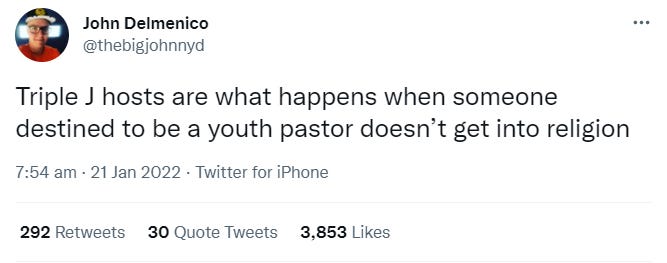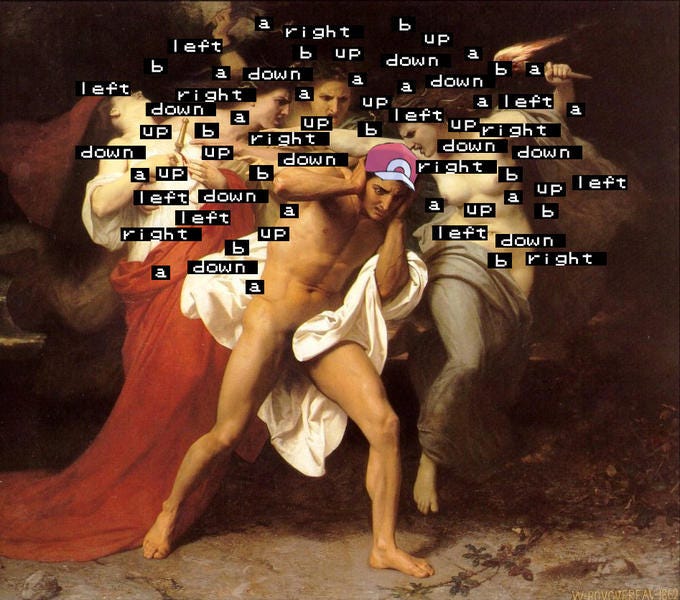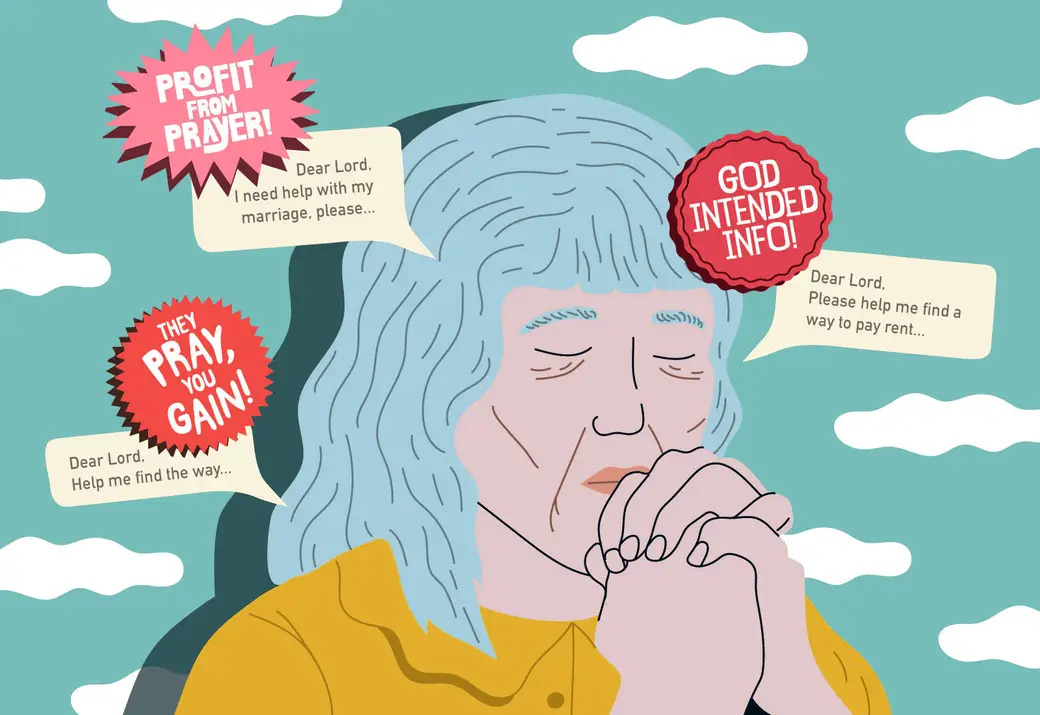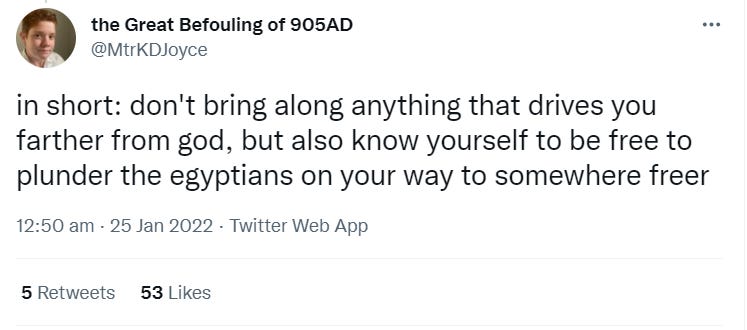Twitch Plays Pokémon made a religion
Also, prayer apps are selling your data
Hello! Last weekend was the Triple J Hottest 100, a poll of the most popular songs played on the Australian national youth station in the last 12 months. Here was my favourite tweet from around the day.

Made all the more appropriate when you remember the #1 song this year was by The Wiggles(?!) It’s very good! I think it deserved the win!
Bird Jesus, Helix Followers and Prophet Flareon
The new game, Pokemon Legends: Arceus releases tomorrow (technically today), which reminds me of one of the greatest religion/video game/internet culture confluences of all time: Twitch Plays Pokemon.
Twitch Plays Pokemon was a 2014 streaming event that allowed more than 100,000 people to all control a single copy of Pokemon Red via the live chat function. Over the course of days, the audience began to create a narrative out of the semi-random inputs and erratic gameplay.

If you have time, watch this entertaining 50 minute documentary by TheGamerFromMars which summarises what happened during the stream and why.
Something that emerged from the chaos? A folk religion - or at least a mythology that has since become part of the internet’s deep lore.
The 2016 edition of The Heidelberg Journal of Religions on the Internet has an article by Jenny Saucerman and Dennis Ramirez that dissects this ‘religion’ and analyses the influence of Christianity upon it.

From the abstract:
We argue that this sophisticated narrative heavily referred to major religious figures, texts, imagery, and structure in Christianity in order to create shared meaning and experiences of the game among Twitch Plays: Pokémon community members. Having this shared meaning and experiences allowed the Twitch Plays: Pokémon religion to proliferate.
Academic articles aren’t often entertaining even if they’re about entertaining topics, but this one is an exception. It includes several memes, a chart of all the religious subfactions within the audience and an altered version of the Lord’s Prayer. Subheadings include: 4.3 Bird Jesus, 6.1 Helix Followers and 6.2 Disciples of the Dome.
Game Informer also has a neat summary of the religious mythology that developed around the stream. Also here’s one from The Loadout. Also here’s a Kotaku article featuring an expanded religion chart.

RIP Sister Janet Mead
Sister Janet Mead, an Australian nun who topped international music charts in 1974 with The Lord’s Prayer, has died.
While best remembered for her meteoric rise to fame in the music world, Sister Janet devoted most of her life to helping the homeless and disadvantaged. …
She was the first Australian artist to have a gold record in the US and was even nominated for a Grammy award but lost out to Elvis Presley.
She was also an activist, speaking out against war, welfare cuts and in favour of industrial action.
Muslim futurism
While at work, one of the guests of the program I produce sent me this link to muslimfuturism.com. First thing on there is this music video called “ALHAMDU | MUSLIM FUTURISM”.
It’s very cool and I’m looking forward to see what else they produce!
Watch out - prayer apps sell your data

If you use a devotional app, it’s likely someone is evesdropping on your prayers. In the last few months, Religion News Service and Christianity Today have both reported on the rise of apps like Glorify and Hallow. These apps have been particularly popular since the pandemic, when the faithful have been cut off from regular worship.
They’re also attracting serious venture capital from prominent firms as well as Peter Thiel and celebrities like Kris Jenner and Jason Derulo. If you use Glorify, James Corden partially funded that experience.
CT and RNS have reported how the apps make money via subscriptions, but Emily Baker-White at BuzzFeed News reports the apps are also generating revinue by harvesting data found in the prayers themselves. The data is cross-referenced with information purchased from data brokers and shared with other companies, including Facebook.
Pray.com collects data about its users in multiple ways. According to its privacy policy, the company records detailed information about users, including their physical location, the links they click on, and the text of the posts they make. Then, it supplements that information with data from “third-parties such as data analytics providers and data brokers,” which can include “your gender, age, religious affiliation, ethnicity, marital status, household size and income, political party affiliation and interests... geographic location, and Personal Information.” The policy also says Pray.com shares users’ personal information, including identifiers that link their activity to specific devices, with “third parties” for “commercial purposes.”
I guess it’s not surprising, but it’s depressing that there really isn’t anywhere tech capitalists won’t speculatively invest and then demand a return.
While reading this article I also learned that Bible Gateway, a website I use practically every other day, is owned by News Corporation and has been making money for years by sharing its users’ information.
Uh… cool. This is how I Jokerfy and add a 💧 to my Twitter name.
This isn’t from the official VeggieTales Twitter account but it should be

Please take a moment to reflect on the cheese nun
Fall of the Falwells
Gabriel Sherman has published this extensive profile on Jerry and Becki Falwell, outlining Jerry’s double life and the Falwell’s version of the scandal that brought their reputation toppling to the ground.
A lot of this detail was already well-known (the third season of the Gangster Capitalism podcast covers a lot of this) but especially notable to me was the section on Jerry Falwell Sr who, according to his son, waged the culture war not because he truly believed what he said, but because he wanted to impress his wife and knew it would be personally advantageous.
Looking back, Jerry said his dad adopted militant stands against drinking and homosexuality to prove to his wife that he would be a conservative Christian. “My mother was the only reason my dad became puritanical,” Jerry said. Jerry said his dad also knew that there was a lucrative market for such beliefs. “He became a different person to build a church and a school,” Jerry said.
On a personal note, it’s incredible to see that the evangelical movement I once identified with so strongly and which demands so much from its followers has such a rotten foundation. It wasn’t all bad by any means, but @MtrKDJoyce says this of keeping what’s good while leaving evangelicalism:

Jerry Falwell himself no longer identifies with evangelicalism, saying this apparently without irony:
“Nothing in history has done more to turn people away from Christianity than organized religion,” he said. “The religious elite has got this idea that somehow their sins aren’t as bad as everyone else’s.”
One last thing before I go

Why can’t I hold all these links:
- Hindu juggernaut chariots
- “god help me i can’t help but hear Jesus with Ricky Gervais’s voice”
- President of the Episcopalian House of Deputies, Rev Gay Clark Jennings, tells Episcopalians to “touch grass”
- lets-get-high-and-deny-christ.jpg

